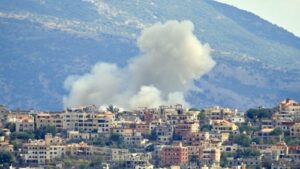US and UK urge ceasefire as Israel launches heaviest strikes on Hezbollah in Lebanon

Israel just carried out its most severe airstrikes in nearly a year on Hezbollah targets in southern Lebanon. The strikes, which occurred on September 19, 2024, were in response to growing tensions following the detonation of Hezbollah operatives’ portable bombs earlier in the week, which killed 37 people and injured hundreds in Lebanon. Israeli jets struck hundreds of rocket launchers that were apparently directed at Israeli land, escalating the current battle between Israel and Hezbollah.
The strikes prompted appeals for caution from both the United States and the United Kingdom, with US officials expressing alarm about potential escalation and underlining the necessity of seeking a diplomatic settlement. Meanwhile, Hassan Nasrallah, the head of Hezbollah, warned that Israel had crossed “red lines” with its recent attacks, sparking worries of future reprisal from the Iran-backed group.
The UN Security Council will meet to review the situation, and Israel has pledged to continue its military operations against Hezbollah in order to safeguard its northern regions and residents from potential missile assaults. This continuous war highlights the larger regional fight between Israel and Iranian-backed militias like as Hezbollah.
The recent violence is intimately linked in the larger struggle between Israel and Hezbollah, an Iranian-backed armed force. Hezbollah’s actions, particularly its regular rocket hits on Israeli territory, have long been a source of conflict. The latest escalation began when handheld communication devices used by Hezbollah agents burst in Lebanon, killing many people and instilling widespread terror. These explosions, which occurred in busy public locations like hospitals and markets, were blamed on Israel’s Mossad intelligence organization.
In reply, Israeli jets launched nearly 50 airstrikes in a two-hour period, attempting to destroy Hezbollah’s rocket-launching infrastructure. This was Israel’s most aggressive military engagement since the conflict began, and both sides appeared on the verge of all-out war.
As the crisis worsens, international voices, including the US and the UK, have advised caution. The United States has expressed deep fears about the likelihood of a larger regional war, citing the region’s complicated web of relationships. Iran, a main patron of Hezbollah, has made clear its support for the group, sparking concerns about future escalation.

